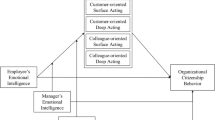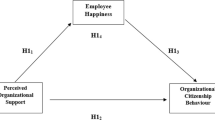Abstract
The purpose of this study is to analyze the effects of supervisors’ political influence behaviors on subordinates’ organizational citizenship behavior (OCB). As a subgoal of the study the effects of those political behaviors on organizational identification (OID) and affective commitment (AC) of subordinates have also been evaluated. Thereby OID and AC are also supposed to be the mediators in the relation between superiors’ political behaviors and subordinate’s OCB. Through convenience sampling method, 265 employees, who are all medical representatives, from 10 companies operating in Turkish pharmaceutical industry have been subjected to survey for this research. The reason of conducting the survey in one sector is to minimize the effects of internal and external environmental factors of different sectors. Data acquired through the questionnaires were analyzed using SPSS 18.0 program. Through this program, hierarchical regression analyses have been implemented to reveal the independent variables’ effects on the dependent variable through the mediator variables. The main hypothesis of the study indicating the effects of the managers’ political behaviors on the employees’ OCB has been accepted. The sub-hypotheses which predicted the mediator effects of OID and AC in the model are also accepted.

Similar content being viewed by others
References
Albert, S., Whetten, D.A.: Organizational Identity. Research in Organizational Behaviour. JAI, Greenwich (1985)
Allen, N.J., Meyer, J.P.: The measurement and antecedents of affective, continuance and normative commitment to the organization. J. Occup. Psychol. 63(1), 1–18 (1990)
Ambrose, M.L., Harland, L.K.: Procedural justice and influence tactics: fairness, frequency and effectiveness. In: Cropanzano, R.S., Kacmar, K.M. (eds.) Organizational Politics, Justice and Support: Managing the Social Climate of the Workplace, pp. 97–130. Quorum Books, London (1995)
Ashforth, B.E., Mael, F.: Social identity theory and the organizations. Acad. Manag. Rev. 14(1), 20–39 (1989)
Baron, R.M., Kenny, D.A.: The moderator–mediator variable distinction in social psychological research: conceptual, strategic and statistical considerations. J. Personal. Soc. Psychol. 51(6), 1173–1182 (1986)
Bateman, T.S., Organ, D.W.: Job satisfaction and the good soldier: the relationship between affect and employee “citizenship”. Acad. Manag. J. 26(4), 587–595 (1983)
Berson, Y., Sosik, J.J.: The relationship between self other rating agreement and influence tactics and organizational processes. Group Organ. Manag. 32(6), 675–698 (2007)
Bolon, D.S.: Organizational citizenship behavior among hospital employees: a multidimensional analysis involving job satisfaction and organizational commitment. Hosp. Health Serv. Adm. 42(2), 221–241 (1997)
Buchanan, D., Badham, R.: Power, Politics and Organizational Change: Winning the Turf Game. Sage, London (1999)
Byrne, Z.S.: Fairness reduces the negative effects of organizational politics on turnover intentions, citizenship behavior and job performance. J. Bus. Psychol. 20(2), 175–200 (2005)
Christiansen, N., Villanova, P., Mikulay, S.: Political influence compatibility: fitting the person to the climate. J. Organ. Behav. 18(6), 709–730 (1997)
Field, A.: Discovering Statistics Using SPSS. Sage, London (2005)
Graham, J.W.: An essay on organizational citizenship behavior. Empl. Responsib. Rights J. 4(4), 249–270 (1991)
Haslam, S.A., Ryan, M.K., Postmes, T., Spears, R., Jetten, J., Webley, P.: Sticking to our guns: social identity as a basis for the maintenance of commitment to faltering organizational projects. J. Organ. Behav. 27, 607–628 (2006)
Heywood, A.: Politics. Macmillan, London (1997)
Hinkin, T.R., Schriesheim, C.A.: Development and application of new scales to measure the bases of social power. J. Appl. Psychol. 74, 561–567 (1989)
James, K.: Antecedents, processes and outcomes of collective (group level) politics in organizations. In: Vigoda-Gadot, E., Drory, A. (eds.) Handbook of Organizational Politics, pp. 53–74. Edward Elgar Publishing, Cheltenham (2006)
Kapani, M.: Politika Bilimine Giriş. Bilgi Yayınevi, Ankara (1995)
Kent, A., Chelladurai, P.: Perceived transformational leadership, organizational commitment, and citizenship behavior: a case study in intercollegiate athletics. J. Sport Manag. 15(2), 135–139 (2001)
Kipnis, D., Schmidt, S.M., Wilkinson, I.: Intraorganizational influence tactics: explorations in getting one’s way. J. Appl. Psychol. 65(4), 440–452 (1980)
Koçel, T.: İşletme Yöneticiliği. Arıkan, İstanbul (2007)
Koslowsky, M., Schwarzwald, J., Ashuri, S.: On the relationship between subordinates’ compliance to power sources and organizational attitudes. Appl. Psychol. Int. Rev. 50(3), 455–476 (2001)
Mael, F.: Organizational identification: construct redefinition and a field application with organizational alumni. Unpublished Doctoral Dissertation, Wayne State University, Detroit (1988)
Mael, F., Ashforth, B.E.: Alumni and their alma mater: a partial test of the reformulated model of organizational identification. J. Organ. Behav. 13(2), 103–123 (1992)
Mael, F.A., Tetrick, L.E.: Identifying organizational identification. Educ. Psychol. Meas. 52(4), 813–825 (1992)
Michela, J.L.: Understanding employees’ reactions to supervisors’ influence behaviors. Int. J. Organ. Anal. 15(4), 322–340 (2007)
Organ, D.W.: Organizational citizenship behavior: it’s construct cleanup time. Hum. Perform. 10(2), 85–97 (1997)
Organ, D.W., Podsakoff, P.M., Mackenzie S.P.: Organizational citizenship behavior: its nature, antecedents, and consequences. Sage Publications, London (2006)
Organ, D.W., Ryan, K.: A meta-analytic review of attitudinal and dispositional predictors of organizational citizenship behavior. Pers. Psychol. 48(4), 775–802 (1995)
Otubanjo, B.O., Melewar, T.C.: Understanding the meaning of corporate identity: a conceptual and semiological approach. Corp. Commun. Int. J. 12(4), 414–432 (2007)
Podsakoff, P.M., MacKenzie, S.B.: Organizational citizenship behaviors and sales unit effectiveness. J. Mark. Res. 3, 351–363 (1994)
Rosen, C.C., Chang, C.H., Levy, P.E.: Personality and politics perceptions: a new conceptualization and illustration using OCBs. In: Vigoda-Gadot, E., Drory, A. (eds.) Handbook of Organizational Politics, pp. 29–52. Edward Elgar Publishing, Cheltenham (2006)
Smith, C., Organ, D., Near, J.: Organizational citizenship behavior: its nature and antecedents. J. Appl. Psychol. 68(4), 653–663 (1983)
Van Dyne, L., Graham, J.W., Dienesch, R.M.: Organizational citizenship behavior: construct redefinition, measurement, and validation. Acad. Manag. J. 37(4), 765–802 (1994)
Van Knippenberg, D., Sleebos, E.: Organizational identification versus organizational commitment: self-definitions, social exchange, and job attitudes. J. Organ. Behav. 27, 585–605 (2006)
Yukl, G., Falbe, C.M.: Influence tactics and objectives in upward, downward, and lateral influence attempts. J. Appl. Psychol. 75(2), 132–140 (1990)
Yukl, G., Fable, C.M., Youn, J.Y.: Patterns of influence behavior for managers. Group Organ. Manag. 18(1), 5–28 (1993)
Yukl, G., Tracey, J.B.: Consequences of influence tactics used with subordinates, peers and the boss. J. Appl. Psychol. 77(4), 525–535 (1992)
Zanzi, A., O’Neill, R.M.: Sanctioned vs non-sanctioned political tactics. J. Manag. Issues 13(2), 245–262 (2001)
Author information
Authors and Affiliations
Corresponding author
Rights and permissions
About this article
Cite this article
Mehtap, O. Understanding the effects of political influence behaviors on informal performances. Qual Quant 48, 2671–2685 (2014). https://doi.org/10.1007/s11135-013-9916-3
Published:
Issue Date:
DOI: https://doi.org/10.1007/s11135-013-9916-3




